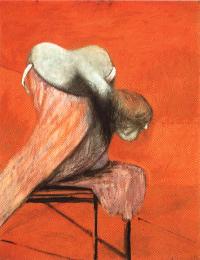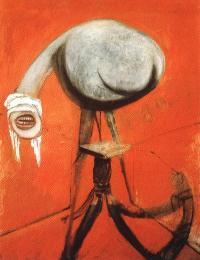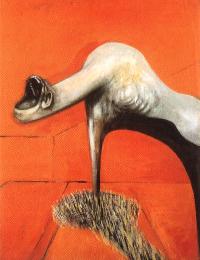October 08, 2003
existentialism?
Trevor I'm rather suprised that you suggest my position in the debate is an existentialist one, given this and this. Your suggestion of an existentialist interpretation seems to be based on my understanding of Nietzsche's revaluation of values in a nihilist world and the existentialist re-establish value in a mechanical world. Both are about values hence they are the same. This ethical concern is to be opposed to the aesthetic.
I do think that the Nietzschean background to the French reception of Nietzsche is important in terms of the concerns it raises. The mood that is picked up can be seen in Nietzsche's essay 'Schopanhauer as an Educator' from his Untimely Meditations:
"Now, how does the philosopher view the culture of our time? Very differently, to be sure, from how it is viewed by those professors of philosophy who are so well contented with their new state. When he thinks of the haste and hurry now universal, or the increasing velocity of life, of the cessation of all contemplativeness and simplicity, he almost thinks that what he is seeing are the symptoms of a total extermination and uprooting of culture. The waters of religion are ebbing away and leaving behind swamps or stagnant pools; the nations are again drawing away from one another in the most hostile fashion and long to tear one another to pieces. The sciences, pursued without any restraint and in a spirit of the blindest laissez faire, are shattering and dissolving all firmly held belief; the educated classes and states are being swept along by a hugely contemptible money economy. The world has never been more worldly, never poorer in love and goodness. The educated classes are no longer lighthouses or refuges in the midst of this turmoil of secularization; they themselves grow daily more restless, thoughtless and loveless. Everything, contemporary art and science included, serves the coming barbarism."
True, that nihilistic mood of living in a crisis is very European and it hardly resonates as a cultural predicament in Adelaide Australia. Australian culture is firmly ensconced in the calculative thinking of the instrumental liberal Enlightenment. What we mostly have is the kneejerk political reaction against nihilism in modernity, on the grounds that it's radical destruction of the western heritage and its decisionism leads to an authoritarian politics. This existential philosophy, responds to, and reflects upon, both the European crisis of 1914-1918 and it senseless self-destruction, and then the 1930s and WW 11. The legacy of this existential philosophy has been repudiated in Australia.
The closest that I can find to the existential mood of angst in an Anglo-Ameican culture is Francis Bacon:



Three Studies for Figures at the Base of a Crucifixion, 1944
Bacon's work also overlaps with surrealism. It signifies the mutilation of the dignity of human body to bestiality and meat, as well as existential horror and the meaninglessness of death. There is an overlapping here not just an out and out opposition.
So we have resonances of the self-critique of European reason lying behind the French existentialism; resonances that circulated through Paris in the 1930s and then again in the 1970s. Maybe these resonances can also be found in the America of the 1950s with the Beat movement? I suspect that the self-critique of European reason more strongly resonated in a deeply disquieted America in the 1980s and 1990s.
I can see that existentialism is a useful pathway to finding our way into the French culture in the 1930s and 1940s. As a philosophical movement, existentialism emphasizes individual existence, freedom, and choice. It holds that human beings define themselves and the world in their own subjectivity; and they wander between choice, freedom, and existential angst. This arises because the existentialists accept Nietzsche's God is Dead; the nihilism of the possibility of finding values disappearing along with God's non-existence;and that if God does not exist, then we are are forlorn, because everything is permissable and there is nothing to cling to. Hence nothingness.
So it is the recognition of one's absolute freedom of choice that is the necessary condition for authentic human existence. Sartre's plays and novels, for instance, express the belief that freedom and acceptance of personal responsibility are the main values in life, and that individuals must rely on their creative powers rather than on social or religious authority.
So existentialism is useful pathway. However, the French existentialism of Sartre, Camus etc is something that I remain on the margins of.
Both Nietzsche and Sartre (existentialist) presuppose freedom as a form of self-mastery: Nietzsche as a Stoic self-mastery that entails a disciplined scupturing of character; or in the existentialist case as a subjective, willful ethical choosing. Heidegger's anxiety and resoluteness in the face of death in Being and Time can also be interpreted as the early Heidegger working within freedom as self-mastery. Hence the frequent charges of 'decisionism' about Heidegger's existential ontology.
On this existential reading we are what we can become. Hence Kierkegaard's Either/Or, the Nietzsche/Foucault/postmodern conception of freedom as self-invention grounded in the mastery of the creative artistic subject; and Heidegger's reworking of a Kierkegardian existential loneliness confronting death as a way to establish meaning and value in Being and Time. I take it that this existential analytic, with its coupling of the individual categories of authenticity, resolve, fate to the political categories of Division 11 of destiny, historicity and das Volk, supports the existential reading. The picture conveyed is of a represssive social world that is full of fear and frustration; a joyless existence overshadowed by death and anxiety.
One can, with the latter the Heidegger, reject the wilful mastery in favour of a caretaking, disclosure and letting be that opens up into an environmental ethics in a technological world. Here caretaking is a saving power that is capable of redeeming a rationalistic, modernizing and nihilistic world.
The shift of the latter Heidegger is a moving away from individualism; away from a radical subjectivism of the sovereign individual that creates a moral world to a letting things be as a counter to the technological mode of being-in-the-world.
The turn away from the existential humanism of freedom being rooted in our subjectivity can be found in Heidegger's Letter on Humanism, which explicitly rejects the Sartrean conception of subjectivity being the starting point and its presupposition of a Cartesian subject/object ontology. The Letter is an attempt by Heidegger to disentangle himself from Sartre's existentialism that owed so much to Heidegger. The point of departure is the individual in the centre of the universe. Such an individual through a complicated process of reflection----called resolve or decisiveness---establishes meaning, value and direction. Sartre remains imprisoned in the categories of Western metaphysics. Heidegger's destruction of these categories involves a movement away from Sartre's Existentialism is a Humanism towards an anti-humanism; away from the individualism of a Kierkegard or Sartre hanging in the air towards a more collectivist readng of Dasein of the people.
So you can have the search for meaning, value and order without embracing existentialism.
Posted by Gary Sauer-Thompson at October 8, 2003 12:53 AM | TrackBack